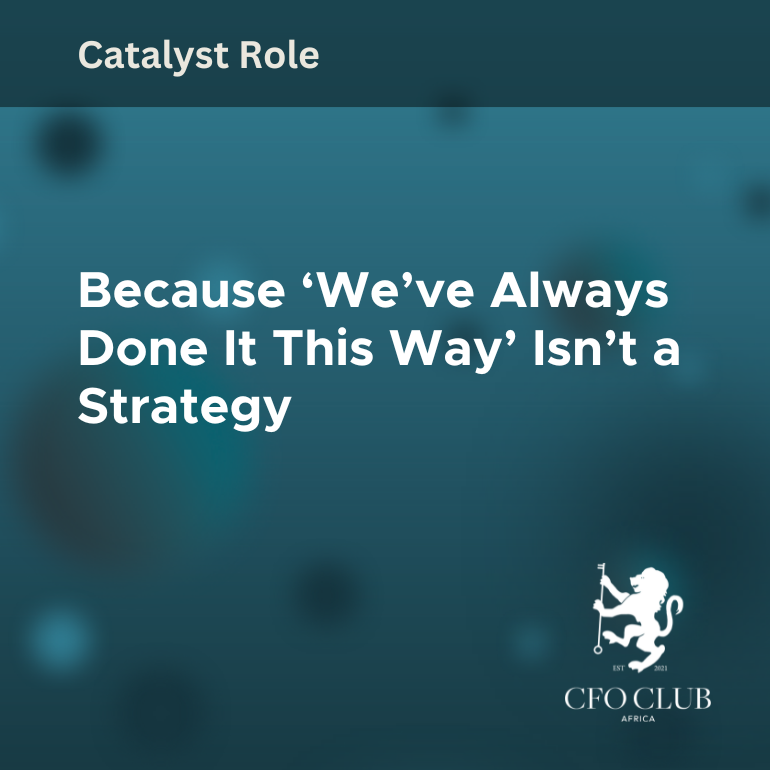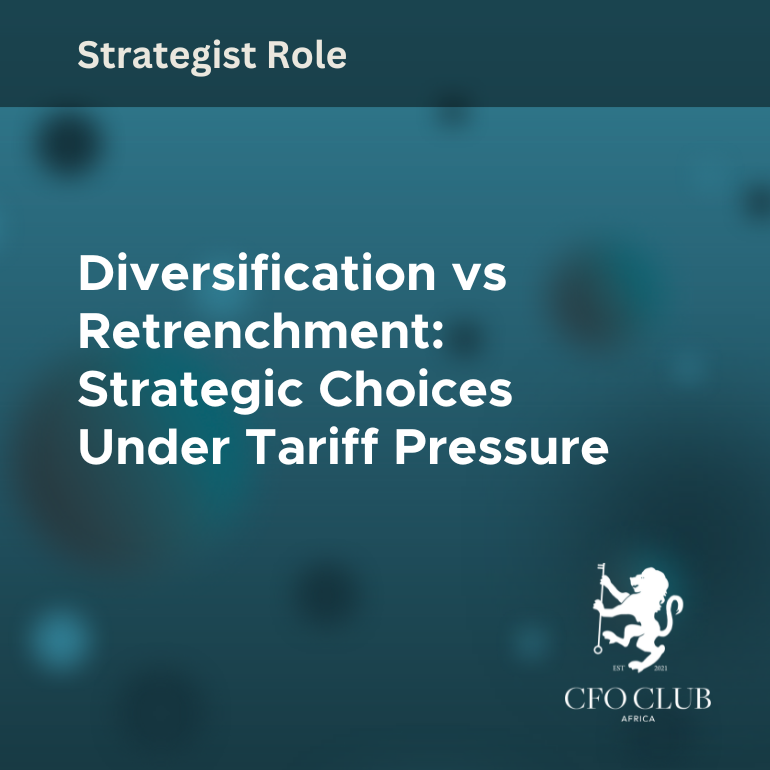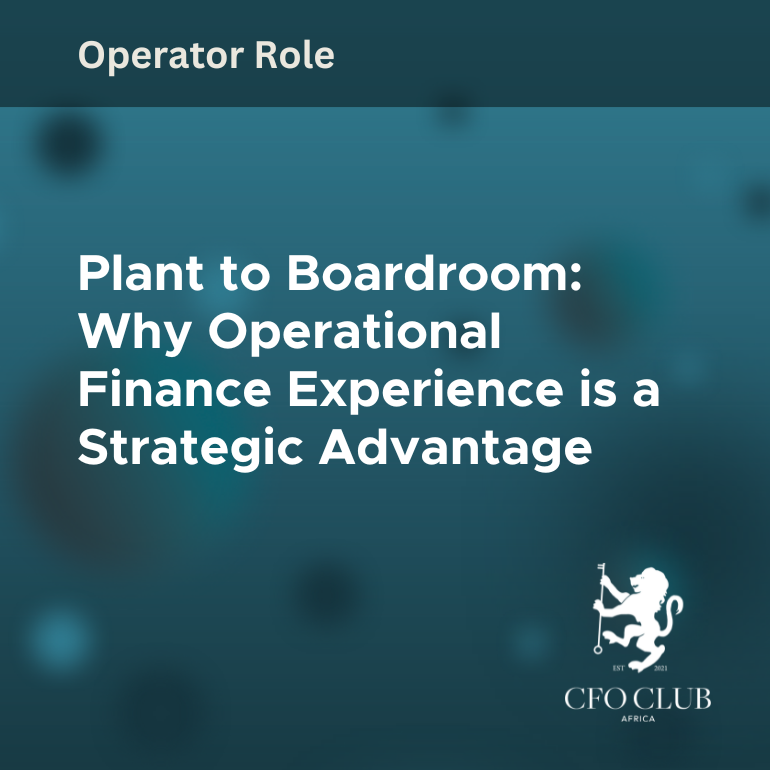Because ‘We’ve Always Done It This Way’ Isn’t a Strategy
In finance, curiosity has often been dismissed as distraction. The industry rewards accuracy, control, and certainty. But the truth is, curiosity is not the opposite of control. It is the driver of better control. It is the quiet force that separates good finance leaders from great ones.
The best CFOs and finance professionals ask questions long before anyone else does. They see patterns others overlook and spot risks before they explode. They understand that finance is not just about managing numbers — it is about understanding what drives them.
When the Numbers Stop Talking
Most finance teams focus on what the data shows. The curious ones dig into what the data hides.
Every variance, every missed target, every unexplained balance tells a story. But too many finance teams treat those stories as noise instead of signals. When your systems report an unexplained R500 000 swing in expenses, do you just fix it, or do you ask why it happened?
That “why” is where leadership starts. Because buried in that question could be a process failure, a fraud risk, or a business opportunity no one has seen yet.
Finance professionals who train themselves to keep asking questions are the ones who find the truth — not just the total.
The Price of Blind Compliance
One of the biggest risks in modern finance is complacency disguised as compliance. Many teams are so focused on ticking the right boxes that they forget to challenge whether those boxes still matter.
We follow standards, we submit reports, we implement systems — but do we ever stop to ask, “Is this helping the business grow? Is this improving transparency or just creating paperwork?”
Curiosity is what keeps compliance honest. It stops finance from becoming a passive reporting function and turns it into a driver of accountability and value. The organisations that thrive are those where finance leaders don’t just say, “This is the rule,” but also ask, “Does the rule make sense here?”
The Courage to Ask Hard Questions
Curiosity takes courage. It means challenging assumptions in boardrooms that don’t like to be questioned. It means being the person who asks, “How do we really know this project is profitable?” when everyone else is ready to move on.
Many finance professionals stay silent because it feels safer. But silence has a cost. When finance stops asking questions, the organisation loses its moral and analytical compass.
Curiosity, in its purest form, is not rebellion. It is responsibility. It is the courage to ask for clarity when millions of rands and hundreds of jobs depend on getting the answer right.
Turning Curiosity into a Habit
Curiosity is not a personality trait. It is a discipline. It starts with small daily habits: reading beyond your comfort zone, walking into other departments to understand how they work, asking clients what frustrates them most.
The future finance professional is a listener before they are an analyst. They connect the dots between departments, data, and decisions. They are not limited to the financial statements — they understand operations, people, technology, and strategy.
This habit of curiosity creates a powerful ripple effect. It builds teams that think ahead, spot inefficiencies early, and bring solutions before problems escalate.
Data Is Only as Smart as the Questions You Ask
We live in a time of dashboards and analytics. Every company is drowning in data but starving for insight. The value of finance today is not in collecting information but in interpreting it.
Technology can tell you what happened. Curiosity tells you why. It helps finance professionals translate patterns into meaning and numbers into decisions.
Artificial intelligence and automation are impressive, but they are not curious. They cannot connect intuition with context. They cannot see that a small change in customer behaviour may signal a bigger market shift. Human curiosity is what turns information into advantage.
Curiosity Creates Trust
Curiosity builds credibility in ways numbers alone cannot. When finance leaders take the time to understand the business beyond their spreadsheets, they earn influence.
Operational teams stop seeing finance as the “compliance police” and start seeing it as a partner. Executives trust finance leaders who understand both the financial and the human side of decisions.
This shift is what makes finance indispensable in modern organisations. It moves the profession from gatekeeping to guiding — from enforcing budgets to enabling growth.
The African Edge
In Africa’s fast-changing markets, curiosity is not optional. Regulations shift, currencies fluctuate, and infrastructure challenges test every plan. What works in one province or country may fail in the next.
Curiosity helps finance leaders adapt. It encourages them to look for local solutions, partner with technology innovators, and test ideas that fit their context instead of copying what works elsewhere.
The most resilient finance teams on the continent are those that ask, “How can we make this work here?” They understand that innovation in Africa is not about perfection — it is about progress through understanding.
The New Definition of Expertise
Expertise used to mean having all the answers. Today, it means knowing what questions matter most.
Curiosity changes how finance professionals grow. It replaces routine with relevance. It encourages learning, collaboration, and continuous improvement. A curious CFO is not the loudest voice in the room but the one who listens hardest and connects the smartest.
This mindset defines the next generation of finance leaders. They are bold enough to challenge, humble enough to learn, and curious enough to keep moving forward.
Curiosity does not just make you better at your job. It makes you impossible to ignore. It turns finance from a function into a force — one that keeps asking better questions and, in doing so, keeps finding better answers.





